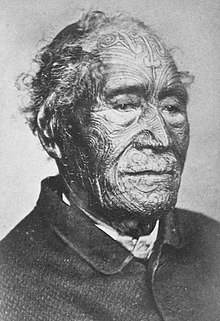Tāmati Wāka Nene
Tāmati Wāka Nene (Thomas Walker Nene; * 1785 ; † August 4, 1871 ) was a Māori tribal leader who fought on the side of the British in the Flagpole War , the first section of the New Zealand Wars.
Origin and Mana
Tāmati Wāka Nene's origins are of high rank. He comes from highly respected Māori families from Tai Tokerau, Bay of Islands and the region around Hokianga Harbor on the North Island of New Zealand . He was related to Hongi Hika and could trace his ancestors back to Rāhiri , the founder of the Iwi of the Ngāpuhi . He rose to one of the warlords of the Ngāpuhi and played an important role in the musket wars from 1818 to 1820.
Nene undertook a successful raid from north to south across the entire North Island of New Zealand down to the Cook Strait . On the other hand, he prevented a war between the Māori of the Bay of Islands and the Hokianga region in 1828 . After his older brother moved to what is now Auckland and one of the top Māori leaders died as a result of a war wound, Nene was one of the three most powerful Māori leaders in the northern North Island.
Support for the Waitangi Treaty
Early on, Nene recognized the importance of trading in pākehā and used his position to promote and protect both traders and Methodist missionaries . He himself was converted in 1839 and took the name Thomas Walker or Tāmati Wāka. He worked closely with James Busby , a British, to improve relations between Māori and Europeans. In 1835 he was one of the signatories of the declaration of independence for New Zealand and thus the United tribes (United Tribes).
The negotiations eventually resulted in the Waitangi Treaty being drafted, and Nene convinced many tribal leaders of the validity of the treaty. Probably he had taken the meaning of the document too literally, because it seems very unlikely that he had voluntarily wanted to give up power.
In the years that followed the treaty, i.e. after 1840, his homeland lost considerable government revenue and influence. The capital of New Zealand was relocated to Auckland, customs duties were no longer allowed, and the economic benefits of the kauri tree ceased after it was no longer allowed to be felled.
Many of the tribal leaders of the north harbored increasing doubts about the Treaty of Waitangi, Nene as well as, for example, Hone Heke . Despite everything, Nene wanted to continue negotiating and hoped for the best. He made a promise to Governor Fitzroy that the peace would hold. Thus Hone Heke's fourth dropping of the British flagpole from Russell was a grave affront to the authority and person of Nene.
Participation in the New Zealand Wars
Nene had already started his war against Heke when British troops reached the scene. They fought side by side, as allies in spite of completely opposing intentions and goals. Nene described the British commander of the Battle of Ohaeawai , Colonel Despard, as "a very stupid person". Despard said again: "If I need help from the savages, I'll let you know." The story tends to prove Nene right. Hone Heke was only really beaten once, in Te Ahu Ahu on June 12, 1845, by Nene and without British help.
After that, Ruapekapeka, Heke and Kawiti, basically undefeated, showed themselves ready to make peace. It was Tāmati Wāka Nene whom they approached and negotiated about a peace treaty. Nene then went to Auckland and announced to the government that the war was over. The British were not involved in this process.
colonization
The government of New Zealand lost a considerable amount of its authority in the north, but Wāka Nene was the one. He and Hone Heke were the two most recognized figures in the Tai Tokerau region. He received a pension of one hundred pounds a year and a house in Kororareka, Russell. He continued to act as an advisor to the government.
When George Gray was knighted, he chose Nene as one of his ceremonial squires.
Tāmati Wāka Nene died on August 4, 1871 and was buried in Russell. The then governor, George Bowen, said Nene did more than any other Māori in support of the colonization of New Zealand and the establishment of the authority of the British crown.
Web links
- Angela Ballara : Nene, Tamati Waka . In: Dictionary of New Zealand Biography . Ministry for Culture & Heritage , September 1, 2010, accessed August 24, 2012 .
| personal data | |
|---|---|
| SURNAME | Nene, Tāmati Wāka |
| BRIEF DESCRIPTION | Māori tribal chief |
| DATE OF BIRTH | 1785 |
| DATE OF DEATH | 4th August 1871 |

